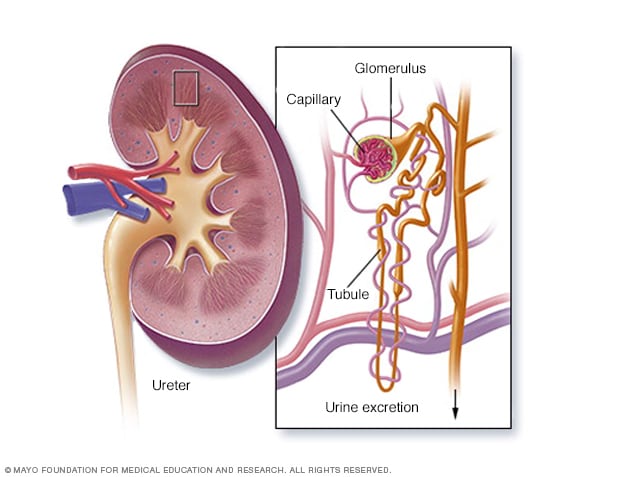How does IgA nephropathy (Berger's disease) cause kidney damage?
IgA nephropathy occurs when an antibody called immunoglobulin A (IgA) builds up in the kidneys. This causes inflammation and scarring that reduces the kidneys' ability to filter waste from the blood.
IgA nephropathy (IgAN), also called Berger's disease, is a disease that causes kidney damage. It occurs when an antibody called immunoglobulin A (IgA) builds up in the kidneys. This causes inflammation and scarring that reduces the kidneys' ability to filter waste from the blood.
How the kidneys filter blood
Kidney cross section

Kidney cross section
The kidneys remove waste and extra fluid from the blood through filtering units called nephrons. Each nephron contains a filter, called a glomerulus. Each filter has tiny blood vessels called capillaries. When blood flows into a glomerulus, tiny bits, called molecules, of water, minerals and nutrients, and wastes pass through the capillary walls. Large molecules, such as proteins and red blood cells, do not. The part that's filtered then passes into another part of the nephron called the tubule. The water, nutrients and minerals the body needs are sent back to the bloodstream. The extra water and waste become urine that flows to the bladder.
Your kidneys are two bean-shaped, fist-sized organs located at the small of your back, one on each side of your spine. Each kidney contains tiny blood vessels that filter waste, excess water, salt and other substances out of your blood. The "clean" filtered blood reenters your bloodstream, while the excess water and waste material becomes urine and eventually leaves your body when you urinate.
The kidneys remove waste and excess fluid from blood through filtering units called nephrons. Each kidney has about one million nephrons.
Each nephron contains a filter, called a glomerulus, that contains blood vessels called capillaries. When blood flows into a glomerulus, tiny molecules such as water, minerals, nutrients and waste pass through the capillaries. This process filters out any extra fluid and unnecessary substances from the bloodstream.
Your kidneys filter about 150 quarts of blood each day. The water, nutrients and minerals your body needs are transferred back to the bloodstream through another part of the nephron called the tubule. The excess water and waste become urine that flows to the bladder and out of the body when you urinate.
This process maintains a healthy balance of water, salts and minerals — such as sodium, calcium, phosphorus and potassium — in your blood. Without this balance, nerves, muscles and other tissues in your body won't properly function. Large molecules, such as proteins and red blood cells, are too big to flow through the glomerulus. This prevents them from being filtered out of the blood stream.
How IgAN affects the kidneys' ability to filter blood
IgA nephropathy damages the areas of the kidneys that filter blood. This occurs when a specific type of antibody, called immunoglobulin A (IgA), builds up in the glomeruli. Antibodies are proteins made by the immune system to fight bacteria, viruses and toxins. But in IgA nephropathy, this antibody builds ups and forms clumps inside the glomeruli.
This buildup triggers inflammation and kidney damage that interferes with the filtering process, causing the kidneys to leak blood and protein into the urine.
Over many years, as IgA continues to build, the damage may eventually cause scarring of the nephrons. Once scarring has occurred, there's no current treatment that will repair a damaged kidney. When your kidneys can't filter properly, dangerous levels of fluid, electrolytes and wastes can build up in your body.
In some cases, IgA nephropathy can lead to end-stage kidney disease. This means the kidneys no longer work as they should to meet the body's needs. A person with end-stage kidney disease needs dialysis or a kidney transplant to stay alive.
May 05, 2023
- IgA nephropathy. National Institutes of Health. National Institute of Diabetes and Digestive and Kidney Diseases. https://www.niddk.nih.gov/health-information/kidney-disease/iga-nephropathy. Accessed April 12, 2023.
- IgA nephropathy (Berger's disease). Mayo Clinic. https://www.mayoclinic.org/diseases-conditions/iga-nephropathy/symptoms-causes/syc-20352268. Accessed April 10, 2023.
- End stage renal disease. Mayo Clinic. End-stage renal disease — Symptoms and causes — Mayo Clinic. Accessed April 15, 2023.